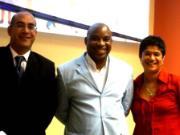
The Centre for Social Development (CSD) and the Institute of Social and Economic Research (ISER) at Rhodes University are venturing beyond the academic environs and engaging national government on substantive issues of social development.
This is with a view of securing long-term collaboration in the areas of Social Policy, Research and Early Childhood Development (ECD).
The Director of the CSD, Ms Vera Adams and Director of ISER Professor Robert Van Niekerk recently presented their research into ECD models at the Department of Social Development’s (DSD) High level Policy Forum in Pretoria, outlining philosophical underpinnings, theories, and models of ECD.
The Forum is the intellectual enterprise of the DSD where officials engage and debate over critical matters of national development and also share experiences and lessons with each other and outside experts.
Defined as a comprehensive approach to policies and programmes for children from birth to nine years, the focus on formal education for this sector in South Africa appears to only start with Grade R.
A national audit of ECD provisioning done by the Department of Education in 2000 shows that in the Eastern Cape, approximately 15.7% of eligible children benefit from an ECD
programme, with a learner teacher ratio of 24:1.
Aimed at encouraging government facilitation of autonomous community development processes, the collaboration builds on findings of the CSD’s experiential learning working with Community Development Practitioners and Self Help Groups in Grahamstown.
Spearheaded by Ms Adams and Prof Van Niekerk, the CSD is currently developing a model of ECD with the support of the ISER, based on ethics of social justice and active citizen participation.
The model views community-based practitioners of development, such as those who provide early childhood education in impoverished schools, as catalytic agents enabling communities to act in self-beneficial ways.
These include enabling communities to ‘think’, by changing mindsets from passive to active intervention in communities; to ‘do’ through developing appropriate knowledge and skills including raising consciousness of problem identification and possible alternative solutions in local communities; and to ‘transform’ through creating a community citizenship based on an ethic of social justice and tangible development outcomes as reflected in improved local economic and social development.
Ms Adams and Prof Van Niekerk argued in their presentation to the DSD that the models are located in “a paradigm shift away from externally driven aid for communities towards an empowerment of communities by encouraging them to take responsibility for their development needs in education, health and welfare through independent self-organisation”.
In this approach greater synergies are built between state and citizens in the delivery of effective services through the identification of education, health and welfare needs within communities by community members who become conscious agents of change within their communities, with the end goal of creating new citizens who are autonomous, self-organised and self-reliant.
The model also integrates a primary health care component into the training of ECD practitioners, following evidence that child learners in ECD practice settings are presenting with a range of health related problems related to poor nutrition and unhealthy living conditions.
The primary health care component of the new model is being developed with the assistance of Professor David Sanders, a world renowned public health specialist and founder of the University of the Western Cape’s School of Public Health.
Ms Adams is contributing with her experience of conducting pioneering research on de-worming during her term as a senior medical scientist at the Medical Research Council in Cape Town.
According to Ms Adams: “The traditional approach of prioritising intellectual development in education has enjoyed limited success in disadvantaged pre-schools and a more holistic approach giving consideration to the context of the child and the challenges faced in the family has gained momentum.”
Dr Ndangwa Noyoo, Senior Social Policy Specialist in the Social Policy Unit of the DSD believes his department can learn from the expertise in the CSD and ISER.
“This is not a one-dimensional issue. It involves the need for government to work collaboratively with progressive sectors of society that resonate with some of our ideas on solutions,” he said.
Dr Noyoo said the emphasis on the ECD practitioners, who will be educated and trained through the CSD, does not mean the role of the state will diminish, as it will still have a constitutional responsibility for delivery of direct services.
“We believe that the state has to play a crucial role and universalization of ECD has to be more practical. These views inform our vision for the DSD.
“Government has not incorporated cognitive evaluation and development, emotional and psychosocial elements and environmental nurturing into ECD. These aspects have been left to the private domain so we don’t have an ECD programme that is holistic and successful,” he said.
Ms Adams said the impending collaboration is well-timed, as while the CSD has 30 years experience of community development, there has not been a systematic evaluation of how this experience can inform government’s attempts to develop new models of community-based practice, until now.
According to Prof Van Niekerk: “The ISER is interested in the implications for policy of the CSD interventionist community development model and we believe there are a number of exciting areas of research that can be pursued with colleagues at the CSD, particularly given our interest in social policy, the effective delivery of which is of such importance to impoverished communities in the Eastern Cape,” he said.
By Sarah-Jane Bradfield
Photo supplied: from l-r: Professor Robert Van Niekerk, Dr Ndangwa Noyoo and Ms Vera Adams at the High Level Policy Forum at the Department of Social Development in Pretoria.
